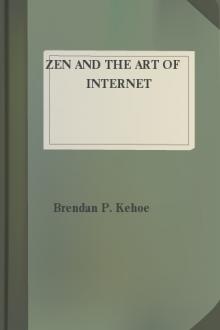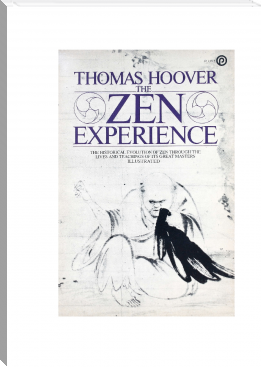Zen and the Art of Internet - Brendan P. Kehoe (good books to read for women txt) 📗

- Author: Brendan P. Kehoe
- Performer: -
Book online «Zen and the Art of Internet - Brendan P. Kehoe (good books to read for women txt) 📗». Author Brendan P. Kehoe
To include a listing of some of the existing sites would not only be far too long for this document, it would soon be out of date. Instead, several lists are being maintained and are available either by mail or via FTP. Also, the Internet Resource Guide (IRG) also describes a few libraries that are accessible---IRG for further information.
Art St. George and Ron Larsen are maintaining a list of Internet-accessible libraries and databases often referred to as ``the St. George directory.'' It began with only library catalogs but has expanded to include sections on campus-wide information systems, and even bulletin board systems that are not on the Internet. The library catalog sections are divided into those that are free, those that charge, and international (i.e. non-U.S.) catalogs; they are arranged by state, province, or country within each section. There is also a section giving dialup information for some of the library catalogs. It's available for FTP (Anonymous FTP) on nic.cerf.net in the directory cerfnet/cerfnet_info/library_catalog. The file internet-catalogs has a date suffix; check for the most current date. The information is updated periodically.
Billy Barron, Systems Manager at the University of North Texas, produces a directory as an aid to his user community. It complements the St. George guide by providing a standard format for all systems which lists the Internet address, login instructions, the system vendor, and logoff information. The arrangement is alphabetic by organization name. It's available for FTP on vaxb.acs.unt.edu in the subdirectory library as the file libraries.txt.
For announcements of new libraries being available and discussion on related topics, consult the Usenet newsgroup comp.internet.library (Usenet News to learn how to read news).
Bulletin Board Systems
The Cleveland Freenet
Freenets are open-access, free, community computer systems. One such system is the Cleveland Freenet, sponsored by CWRU (Case Western Reserve University). Anyone and everyone is welcome to join and take part in the exciting project---that of a National Telecomputing Public Network, where everyone benefits. There's no charge for the registration process and no charge to use the system.
To register, telnet to any one of
freenet-in-a.cwru.edu freenet-in-b.cwru.edu freenet-in-c.cwru.edu
After you're connected, choose the entry on the menu that signifies you're a guest user. Another menu will follow; select Apply for an account, and you'll be well on your way to being a FreeNet member.
You will need to fill out a form and send it to them through the Postal Service---your login id and password will be created in a few days. At that point you're free to use the system as you wish. They provide multi-user chat, email, Usenet news, and a variety of other things to keep you occupied for hours on end.
Directories
There are a few systems that are maintained to provide the Internet community with access to lists of information---users, organizations, etc. They range from fully dedicated computers with access to papers and research results, to a system to find out about the faculty members of a university.
Knowbot
Knowbot is a ``master directory'' that contains email address information from the NIC WHOIS database (Whois), the PSI White Pages Pilot Project, the NYSERNET X.500 database and MCI Mail. Most of these services are email registries themselves, but Knowbot provides a very comfortable way to access all of them in one place. Telnet to nri.reston.va.us on port 185.
White Pages
PSI maintains a directory of information on individuals. It will list the person's name, organization, and email address if it is given. Telnet to wp.psi.net and log in as fred. The White Pages Project also includes an interface to use Xwindows remotely.
Faculty and Staff Listings
Many universities offer access to information on current faculty and staff. Included are:
Cornell Telnet to cuinfo.cornell.edu on port 3000. NC State Telnet to ccvax1.cc.ncsu.edu and log in as info. Rutgers Telnet to hangout.rutgers.edu on port 98. U of Maryland Telnet to umail.umd.edu and log in as lookup. UNC Chapel Hill Telnet to info.acs.unc.edu and log in as info. Yale Telnet to yalevm.ycc.yale.edu on port 300.
Databases
For information on database services, Commercial Databases. Not all databases on the Internet require payment for use, though. There do exist some, largely research-driven databases, which are publicly accessible. New ones spring up regularly.
To find out more about the databases in this section, contact the people directly responsible for them. Their areas of concentration and the software used to implement them are widely disparate, and are probably beyond the author's expertise. Also, don't forget to check with your local library---the reference librarian there can provide information on conventional resources, and possibly even those available over the Internet (they are becoming more common).
Colorado Alliance of Research Libraries (CARL)
The Colorado Alliance of Research Libraries (CARL), in association with CARL Systems Inc., operates a public access catalog of services. Offered are a number of library databases, including searches for government periodicals, book reviews, indices for current articles, and access to to other library databases around the country. Other services are available to CARL members including an online encyclopedia. Telnet to pac.carl.org, or write to help@carl.org for more details.
PENpages
PENpages is an agriculturally-oriented database administered by Pennsylvania State University. Information entered into PENpages is provided by numerous sources including the Pennsylvania Dept. of Agriculture, Rutgers University, and Penn State. Easy-to-use menus guide users to information ranging from cattle and agricultural prices to current weather information, from health information to agricultural news from around the nation. A keyword search option also allows users to search the database for related information and articles. The database is updated daily, and a listing of most recent additions is displayed after login. Telnet to psupen.psu.edu and log in as the user PNOTPA.
Clemson Univ. Forestry & Agricultural Network
Clemson maintains a database similar to PENpages in content, but the information provided tends to be localized to the Southeastern United States. A menu-driven database offers queries involving the weather, food, family, and human resources. Telnet to eureka.clemson.edu and log in as PUBLIC. You need to be on a good VT100 emulator (or a real VT terminal).
University of Maryland Info Database
The Computer Science department of the University of Maryland maintains a repository of information on a wide variety of topics. They wish to give a working example of how network technology can (and should) provide as much information as possible to those who use it. Telnet to info.umd.edu and log in as info. The information contained in the database is accessible through a screen-oriented interface, and everything therein is available via anonymous FTP.
There is a mailing list used to discuss the UMD Info Database, welcoming suggestions for new information, comments on the interface the system provides, and other related topics. Send mail to listserv@umdd.umd.edu with a body of
subscribe INFO-L Your Full Name
Listservs for more information on using the Listserv system.
University of Michigan Weather Underground
The University of Michigan's Department of Atmospheric, Oceanic, & Space Sciences maintains a database of weather and related information for the United States and Canada. Available are current weather conditions and forecasts for cities in the U.S., a national weather summary, ski conditions, earthquake and hurricane updates, and a listing of severe weather conditions. Telnet to madlab.sprl.umich.edu on port 3000 to use the system.
Geographic Name Server
A geographic database listing information for cities in the United States and some international locations is maintained by Merit, Inc. The database is searchable by city name, zip code, etc. It will respond with a lot of information: the area code, elevation, time zone, and longitude and latitude are included. For example, a query of 19013 yields
0 Chester 1 42045 Delaware 2 PA Pennsylvania 3 US United States F 45 Populated place L 39 50 58 N 75 21 22 W P 45794 E 22 Z 19013 Z 19014 Z 19015 Z 19016
..
To use the server, telnet to martini.eecs.umich.edu on port 3000. The command help will yield further instructions, along with an explanation for each of the fields in a reponse.
FEDIX---Minority Scholarship Information
FEDIX is an on-line information service that links the higher education community and the federal government to facilitate research, education, and services. The system provides accurate and timely federal agency information to colleges, universities, and other research organizations. There are no registration fees and no access charges for FEDIX whatsoever.
FEDIX offers the Minority On-Line Information Service (MOLIS), a database listing current information about Black and Hispanic colleges and universities.
Daily information updates are made on federal education and research programs, scholarships, fellowships, and grants, available used research equipment, and general information about FEDIX itself. To access the database, telnet to fedix.fie.com and log in as fedix.
Science & Technology Information System
The STIS is maintained by the National Science Foundation (NSF), and provides access to many NSF publications. The full text of publications can be searched online and copied from the system, which can accommodate up to ten users at one time. Telnet to stis.nsf.gov and log in as public. Everything on the system is also available via anonymous FTP. For further information, contact:
STIS, Office of Information Systems, Room 401 National Science Foundation 1800 G. Street, N.W. Washington, D.C. 20550 stis-request@nsf.gov
(202) 357-7492
(202) 357-7663 (Fax)
Ocean Network Information Center
The University of Delaware College of Marine Studies offers access to an interactive database of research information covering all aspects of marine studies, nicknamed OCEANIC. This includes the World Oceanic Circulation Experiment (WOCE) information and program information, research ship schedules and information, and a Who's Who of email and mailing addresses for oceanic studies. Data from a variety of academic institutions based on research studies is also available. Telnet to delocn.udel.edu and log in as INFO.
NASA/IPAC Extragalactic Database (NED)
The NASA/IPAC Extragalactic Database (NED) is an ongoing project, funded by NASA, to make data and literature on extragalactic objects available over computer networks. NED is an object-oriented database which contains extensive information for nearly 132,000 extragalactic objects taken from about major catalogs of galaxies, quasars, infrared and radio sources. NED provides positions, names, and other basic data (e.g. magnitude types, sizes and redshifts as well as bibliographic references and abstracts). Searches can be done by name, around a name, and on an astronomical position. NED contains a tutorial which guides the user through the retrieval process. Telnet to ipac.caltech.edu and log in as ned.
U.S. Naval Observatory Automated Data Service
Operated by the U.S. Naval Observatory in Washington, D.C., this automated data service provides database access to information ranging from current navigational satellite positioning, astronomical data, and software utilities. A wide variety of databases can be searched and instructions for file transfer are given. Telnet to tycho.usno.navy.mil and log in as ads.
``My consciousness suddenly switched locations, for the first time in my life, from the vicinity of my head and body to a point about twenty feet away from where I normally see the world.'' Howard Rheingold, Virtual Reality p255
Various Tools
New and interesting ways to use the Internet are being dreamed up every day. As they gain wide-spread use, some methods become near-standard (or actual written standard) tools for Internet users to take advantage of. A few are detailed here; there are undoubtedly others, and new ideas spring up all the time. An active user of the Internet will discover most of the more common ones in time. Usually, these services are





Comments (0)